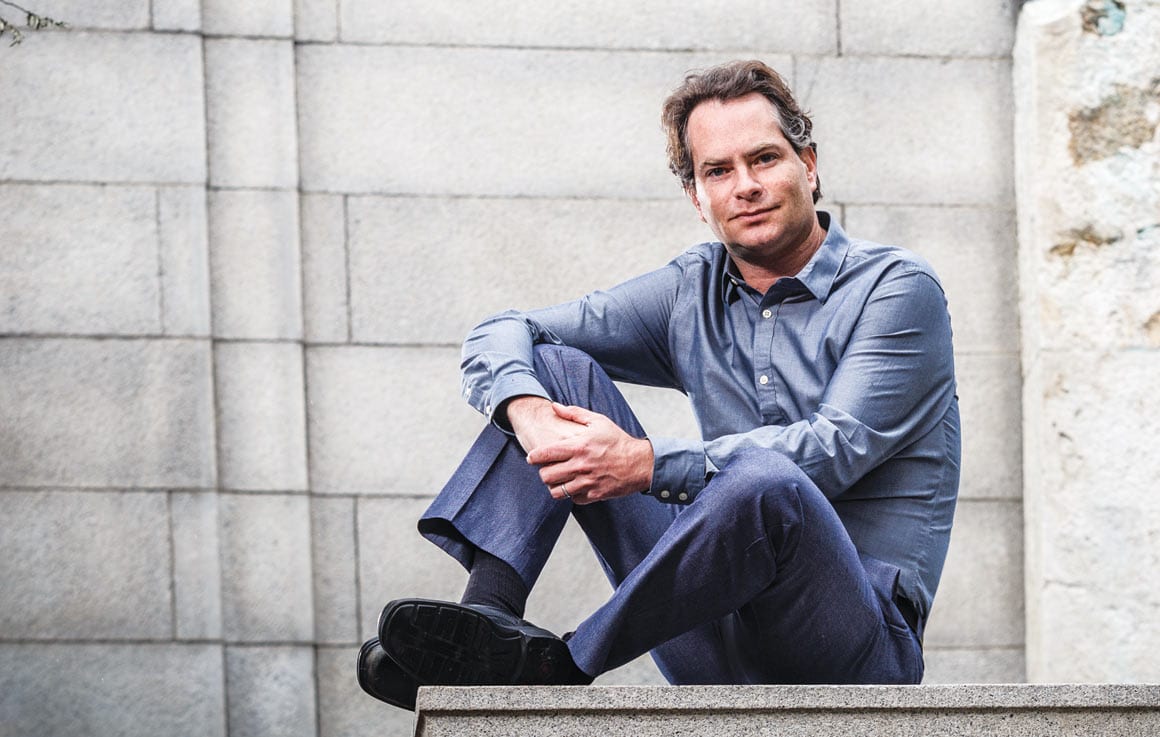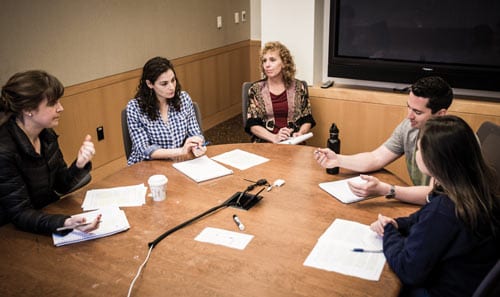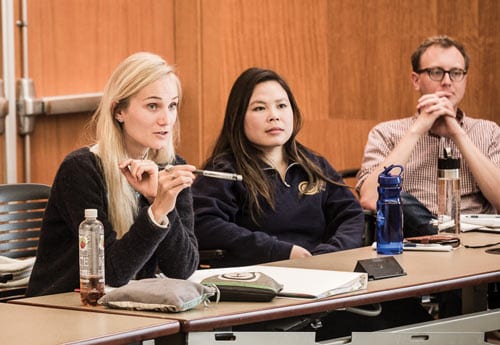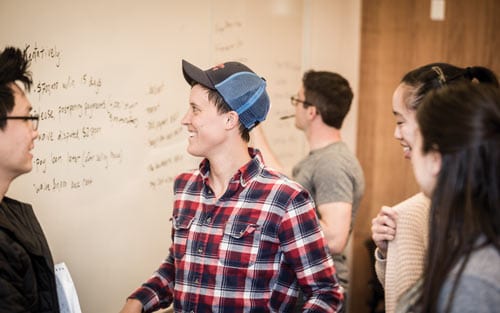
Ty Alper dives into his new role leading Berkeley Law’s experiential education strategy.
By Andrew Cohen
At times, it seems as if the legal profession has changed more in the past eight years than in the previous eight decades. Waves from the 2008 economic downturn continue to rock financial models at many law firms. Legal practice is increasingly complex amid an explosion of international transactions. And an ever-growing number of individuals in need can’t afford legal representation.
Law schools everywhere have responded by riding the surf. As the legal profession evolves in ways that demand greater readiness from today’s law grads, the pressure mounts on schools to provide them with valuable pragmatic experience.
Berkeley Law has long been proactive in helping students hone concrete lawyering skills. In recent years, however, the school has greatly expanded its clinical and professional skills offerings.
Clinical professor Ty Alper, associate dean for experiential education, leads Berkeley Law’s efforts to craft a long-range plan for hands-on learning. In January 2015, the school launched the Experiential Education Task Force, which Alper co-chairs with professor Eric Biber, to evaluate where Berkeley Law stands and where it can improve.
Alper recently discussed his team’s findings—and how to give students more practical learning opportunities—with senior communications writer and Transcript managing editor Andrew Cohen.
Andrew Cohen: What is experiential education?
Ty Alper: It’s learning through direct experience. Experiential education is learning to drive in an actual car, with your hands on the wheel—and with your mom in the passenger seat, gripping the door handle. Most people learn best by doing, even though that can be nerve-wracking, embarrassing, or downright scary. It can also be thrilling and life-changing. In law schools, experiential education tends to mean clinics, field placements, advocacy competitions, and skills classes and similar courses that give students an opportunity to perform in the role of lawyer, on behalf of either real or simulated clients.

Is there growing pressure on law schools to deliver graduates who can hit the ground running?
Sure. Of course, no young lawyer right out of law school could possibly know everything she needs to know to be a world-class attorney. So we like to say that we’re preparing our students to enter the profession—to have the analytical and performance skills, ethical radar, and professional values needed to grow and succeed in a fast-changing legal world. Outstanding teaching instills in our students the ability to apply what they’ve learned to new situations. That’s what we strive to do for them.
Your new position seems like a high-pressure gig. What attracted you to take on this role?
I love scheduling meetings, reading emails, and having difficult conversations. How could I pass it up? Seriously, though, I find the job very rewarding, in part because I have such wonderful colleagues. For years, I’ve been inspired by my fellow clinical teachers, and now I get to work not only with them, but also on a daily basis with colleagues across our entire experiential faculty. And I have great partners in Kristen Holmquist [associate director of experiential education] and Eric Biber [Experiential Education Task Force co-chair].
What’s the most challenging part of leading this effort?
Not having the time or resources to do everything we want to do, at least not right away. There are so many new, exciting opportunities to give students hands-on learning experiences that contribute to the law school’s public service mission, but there are only so many new initiatives we can pursue at once.
What are the task force’s main goals?
Berkeley Law should be a leader in offering rigorous, well-conceived, creative experiential offerings that further our mission to produce exceptional lawyers. The task force has engaged with students, staff, faculty, alums, and employers over the course of the past 12-plus months to develop a vision for the future scope of experiential education at the school. We released the second of three public reports in March. It includes some preliminary recommendations. The final report, due this fall, will reflect our school community’s feedback on these recommendations, and proposals for implementation.
 What are those preliminary recommendations?
What are those preliminary recommendations?
First, defining our experiential education categories and developing a consistent, lucid classification for our offerings, so we convey what they provide, how they differ, and our expectations for them. Second, guaranteeing all students an in-house, community, or practicum clinic experience in which they work on behalf of an actual client, and under the supervision of a Berkeley Law instructor. We also would like to increase opportunities for training in legal writing, expand experiential opportunities in the first-year curriculum, broaden our institutional investment in our Field Placement and Pro Bono programs, and offer more experiential offerings in fields that we’re currently underserving—especially transactional and business law.
As if that weren’t enough, we’re striving to increase experiential opportunities for LL.M.s., expand interdisciplinary experiential opportunities, and provide resources to support more experiential teaching in our doctrinal courses. It’s a tall order, admittedly.
How do Berkeley Law’s experiential ed offerings stack up to those at other top schools?
Berkeley Law is a leader in clinical and skills education. It wasn’t always so, but our Clinical Program has dramatically expanded over the past two decades. We were thrilled to launch two new in-house clinics last fall—the Environmental Law Clinic and the Policy Advocacy Clinic— adding to our three existing in-house clinics. Our community-based clinics at the East Bay Community Law Center continue to serve thousands of low-income East Bay residents and give more than 100 students each year the chance to represent clients under the supervision of staff attorneys. As the gap continues to grow between the needs of low-income people and their access to the legal system, Berkeley Law students are poised to make a difference.
Our skills program is also flourishing, including robust field placement offerings and an unparalleled array of projects that give first-year students more than two dozen opportunities to get their feet wet in legal practice. We have a full-time first-year legal research and writing faculty that I’m completely confident is the best in the nation. But as we expand our offerings, our peers are doing so as well. We’re certainly not resting on our laurels.
What are the biggest gaps that you still need to address?
To thrive in today’s legal domain, new lawyers need to enter practice with a broader and nimbler skill set across a wider range of disciplines. At Berkeley Law, we have the opportunity to partner with the world-class schools on campus, and we’re exploring ways to do that. We also know we need to provide more experiential opportunities in business and transactional law. There’s great momentum to pursue initiatives that help students address different unmet needs in the community.
 How influential are external voices in making Berkeley Law’s curricular approach more hands-on?
How influential are external voices in making Berkeley Law’s curricular approach more hands-on?
The new ABA and proposed California State Bar requirements reflect increasing calls for graduate students who are truly ready to enter the profession. The majority of our students already surpass those thresholds, so for us the requirements are in the background. They’ll impact some of our curricular decisions, but likely won’t drive major decisions. As an institution, we’re committed to providing opportunities for all of our students to learn by doing, no matter what areas of law they plan to pursue. We do that regardless of whether accrediting agencies require it.
Is there concern about rushing into new experiential offerings without due diligence?
Sure, especially when we’re talking about experiential offerings involving real clients. High-quality experiential teaching is not easy. We need to be careful about expanding our programs on the cheap or without sufficient attention to the complexities of real client representation. Because of that, we’ve solicited input from hundreds of members of the law school community. Students, faculty, staff, alums, and employers have filled out surveys and attended focus groups. We’ve reviewed memos from the school’s previous task forces and committees that worked on experiential education, and have spent a lot of time compiling and assessing the data. This is a careful, 18-month process designed to produce a menu of recommendations that our community has vetted and largely supports.
How vital are the Student-Initiated Legal Services Projects in providing students with key client experience right away and in recruiting top-tier students?
So important. Our students rave about these projects, which allow first-year students to work on behalf of clients in a wide range of areas, from immigration to housing to foster education to veterans’ assistance. Many of our students applied to law school because they wanted to make a difference in the world. The opportunity to have those experiences right off the bat reminds them of their motivations, exposes them to clients in desperate need of legal representation, and lets them begin to develop basic lawyering skills.
How has alumni involvement helped fuel the experiential ed program, and how can the program best engage with graduates?
Berkeley Law alumni already do so much for our experiential program, whether it’s supervising a first-year project, coaching one of our many award-winning competition teams, or consulting pro bono in clinical cases.
But we also need to learn continuously from our alums—not only through reflecting on their experiences as students, but from how they view the profession’s current state and their ideas about how to better prepare today’s students for the world they’re about to enter.
The number of Berkeley Law students participating in a clinic has increased 50 percent over the past decade. Can the school sustain that growth?
Increased demand for our clinics is a good problem to have, but we do need to address it. Our two new in-house clinics—the first here in more than a decade—will satisfy some of the demand. We also have a coordinated Clinical Fellowship Program for the first time this year, and we’ve welcomed six new clinical fellows into it. They’re young lawyers with a passion for social justice, and for teaching and mentoring. It’s a win-win for us, allowing greater capacity in the clinics and providing a career path for lawyers—many of whom are Berkeley Law graduates—interested in clinical teaching.
You’ve said that even some doctrinal courses are incorporating experiential education. How so?
It’s been fun for me to learn about that. Some of it is relatively formal—such as a separate lab component of a Criminal Procedure course, where students write and argue motions based on law they’re learning concurrently in class. We also had a Legislation course where students worked in teams to draft medical marijuana initiatives for the Florida ballot, which were then reviewed by a prominent practitioner in the field who also guest-lectured in class.
Other experiential teaching happens through short in-class exercises, field trips, or other creative initiatives. I have a feeling we’ve only scratched the surface in terms of what we can do in this area. We’ve heard from many colleagues that they’re interested in learning how to better incorporate experiential modules into their doctrinal courses.
What’s the ideal balance between doctrinal and experiential education?
I’m not sure it’s right to think of them as separate things. In fact, one reason we’re so excited about experiential education is that it does a great job of teaching both lawyering skills and doctrine. We just talked about all of the ways that doctrinal teachers are infusing their courses with experiential learning. These teachers will tell you that not only do the exercises add a real-world element to the classroom, they also help students learn the law. And most experiential courses—clinics, legal writing courses, trial practice, and so on—teach doctrine. They just use hands-on methods to do it.



